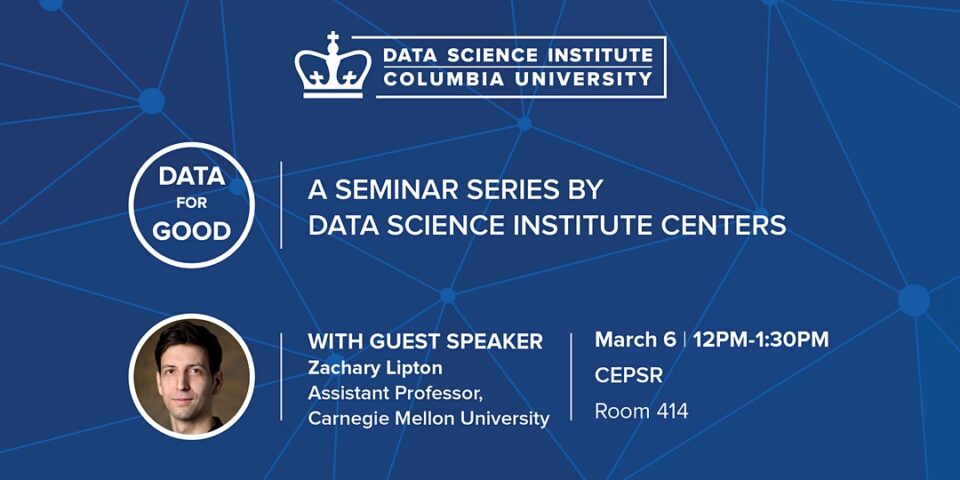Data for Good: Zachary Lipton, Carnegie Mellon University
Friday, March 6, 2020
7:00 am - 8:00 am

Friday, March 6, 2020
7:00 am - 8:00 am


Data for Good seminars address societal challenges and bring humanistic perspectives to science and technology.
Zachary Lipton, Assistant Professor of Operations Research and Machine Learning, Carnegie Mellon University
Algorithmic Fairness from a Non-Ideal Perspective
Inspired by recent breakthroughs in predictive modeling, practitioners in both industry and government have turned to machine learning with hopes of operationalizing predictions to drive automated decisions. Unfortunately, many social desiderata concerning consequential decisions, such as justice or fairness, have no natural formulation within a purely predictive framework. In efforts to mitigate these problems, researchers have proposed a variety of metrics for quantifying deviations from various statistical parities that we might expect to observe in a fair world and offered a variety of algorithms in attempts to satisfy subsets of these parities or to trade off the degree to which they are satisfied against utility. In this paper, we connect this approach to emph{fair machine learning} to the literature on ideal and non-ideal methodological approaches in political philosophy. The ideal approach requires positing the principles according to which a just world would operate. In the most straightforward application of ideal theory, one supports a proposed policy by arguing that it closes a discrepancy between the real and the perfectly just world. However, by failing to account for the mechanisms by which our non-ideal world arose, the responsibilities of various decision-makers, and the impacts of proposed policies, naive applications of ideal thinking can lead to misguided interventions. In this paper, we demonstrate a connection between the fair machine learning literature and the ideal approach in political philosophy, and argue that the increasingly apparent shortcomings of proposed fair machine learning algorithms reflect broader troubles faced by the ideal approach. We conclude with a critical discussion of the harms of misguided solutions, a reinterpretation of impossibility results, and directions for future research.
Bio: Zachary Chase Lipton is an assistant professor of Operations Research and Machine Learning at Carnegie Mellon University. His research spans core machine learning methods and their social impact and addresses diverse application areas, including clinical medicine and natural language processing. Current research focuses include robustness under distribution shift, breast cancer screening, the effective and equitable allocation of organs, and the intersection of causal thinking with messy data. He is the founder of the Approximately Correct (approximatelycorrect.com) blog and the creator of Dive Into Deep Learning, an interactive open-source book drafted entirely through Jupyter notebooks. Find on Twitter (@zacharylipton) or GitHub (@zackchase).